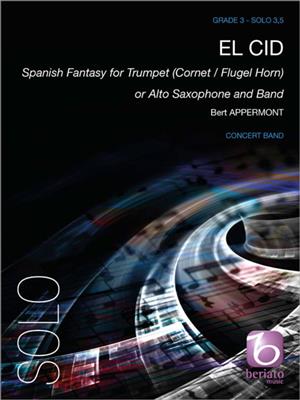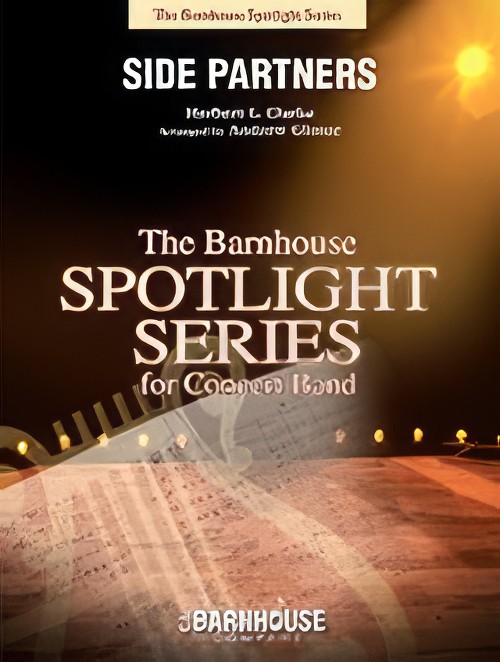Results
-
£54.99
Martha - Friedrich von Flotow
Note: This is a reprint from a vintage publication of 1905. No conductor score is published for this work. The Solo Cornet part serves as a conductor guide.Parts for Eb Horns are included; no F Horn parts are published for this work. If a C Piccolo/C Flute part was not published originally, one has been subsequently added by our editorial staff.
Estimated dispatch 7-14 working days
-
£54.99
A Jolly Rover - Fred Jewell
Note: This is a reprint from a vintage publication of 1905. No conductor score is published for this work. The Solo Cornet part serves as a conductor guide.Parts for Eb Horns are included; no F Horn parts are published for this work. If a C Piccolo/C Flute part was not published originally, one has been subsequently added by our editorial staff.
Estimated dispatch 7-14 working days
-
 £149.40
£149.40En bitte liten funklende stjerne - Numme
This song written by Yngvar Numme and Benny Borg was made popular by Norwegian group Dizzie Tunes on one of their Christmas-albums. This arrangement is based on the Dizzie Tunes version and features the original solo for trumpet or cornet. The Drum Set part is optional so one can perform the arrangement without this part.
Estimated dispatch 7-14 working days
-
 £137.99
£137.99El Cid - Bert Appermont
El Cid was the name of the legendary knight and folk hero Rodrigo D az de Vivar Cameador, the man who never lost a duel. After a typically Spanish opening, a slower section follows in which the composer makes reference to Albinoni'sAdagio and to the slow movement from Joaqu n Rodrigo's Concierto d'Aranjuez. The music is whipped up with Spanish passion at the close, and castanets are a must! The solo part can be played by trumpet, flugelhorn, cornet oralto saxophone and is also available in a simplified version.
Estimated dispatch 7-14 working days
-
 £40.00
£40.00Scramble - Nigel Hess
Commissioned in 1994 by the Royal Air Force, 'Scramble!' is a concert overture for symphonic wind band inspired by images of the RAF's airfields during the Battle of Britain, immortalised for ever in such films as 'Reach for theSky'. The pastoral opening depicts the lull before the storm: the young pilots sitting in wicker chairs outside their barracks on a sunlit morning. The peace is, of course, deceptive, suddenly amid siren sounds, there is a shoutof 'Scramble!', and a rush to the waiting planes. In no time at all the squadron is airborne, heading for a skirmish over the English Channel and beyond. A lyrical central section featuring a solo cornet depicts the stillnessmanypilots described as they flew to engage the enemy, before the battle breaks out once more. For those who returned, it would be only a short while before, once again, they would hear the familiar shout of 'Scramble!'
Estimated dispatch 7-14 working days
-
 £115.60
£115.60I Don't Know How to Love Him - Andrew Lloyd Webber
This is a ballad from the rock-opera "Jesus Christ Superstar" written by Andrew Lloyd Webber (Music) and Tim Rice (Lyrics). Together with the title song, this ballad is the most popular tune from Jesus Christ Superstar. It's recorded and performedlive by many artists since the music saw the light of day in 1971.This arrangement can be performed with a vocal- or instrumental solist. In addition to the vocal solo part, there are also solo-options for the followinginstruments:Flute Oboe Bassoon Clarinet in Bb Altosax Tenorsax Trumpet/Cornet F-horn Euphonium/Trombone
Estimated dispatch 7-14 working days
-
 £72.00
£72.00Side Partners (Brass Duet with Concert Band - Score and Parts) - Clarke, Herbert L. - Glover, Andrew
The era of old-time concerts in the park comes back to life with "Side Partners." Composed by cornet virtuoso, Herbert L. Clarke, for himself and his long-time friend, Sousa Band trombonist Frank Holton, this delightful piece can be played by two cornets/trumpets, two trombones, two euphoniums, or any combination of these instruments. Feature your two outstanding brass players in this charming work. The accompaniment requires a minimum of rehearsal, and the solo parts are flashy without being overly demanding. An excellent choice also for community bands. Delightful music! Duration: 4.15
Estimated dispatch 7-14 working days
-
 £64.95
£64.95AMERICAN PATROL (Army Journal) - Gray, Jerry - Duthoit, W. J.
Army Journal 722. Movie Theme. A full listing of Chappell Army Journals is available - click the Chappell symbol on the home page. Printed to Order. Each set includes Conductor (Condensed Score); 2 x Solo B flat Clarinet; 2 x 1st B flat Cornet; 2 x Basses and 1 each of all other parts as originally published. We are unable to supply parts not included in the original sets.
Estimated dispatch 7-14 working days
-
 £64.95
£64.95BIG COUNTRY, The (Army Journal) - Moross, Jerome - Statham, Leslie
Army Journal 853. Movie Theme. A full listing of Chappell Army Journals is available - click the Chappell symbol on the home page. Printed to Order. Each set includes Conductor (Condensed Score); 2 x Solo B flat Clarinet; 2 x 1st B flat Cornet; 2 x Basses and 1 each of all other parts as originally published. We are unable to supply parts not included in the original sets.
Estimated dispatch 7-14 working days
-
 £64.95
£64.95BY THE SLEEPY LAGOON (Army Journal) - Coates, Eric - Godfrey, Dan
Army Journal 609. A full listing of Chappell Army Journals is available - click the Chappell symbol on the home page. Printed to Order. Each set includes Conductor (Condensed Score); 2 x Solo B flat Clarinet; 2 x 1st B flat Cornet; 2 x Basses and 1 each of all other parts as originally published. We are unable to supply parts not included in the original sets.
Estimated dispatch 7-14 working days
